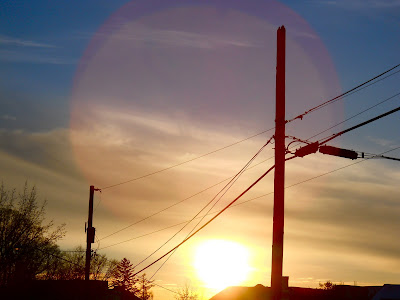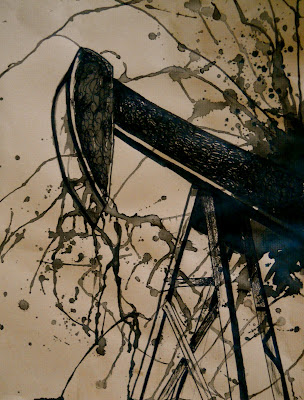
This original story is based on the Navajo legend Coyote and The Giant, and is illustrated by my paintings :)
I.
Old Woman cradles a Styrofoam cup. "Where are you going?"
"Nowhere," says Coyote. "I'm wandering."
People and animals churn around them in black currents, clumps of Geese and Young Women laughing with loud, unsympathetic mouths. Coyote flattens his ears. They might as well be blind. "The city is a whirlpool--all roads lead in." He licks his paw and tastes poison.
Across the street Fox smiles from behind a booth of knock-off purses. Her smile broadens as she pretends not to see Snake eyeing her diamond bag like a fat mouse. Which it might be, thinks Coyote, knowing Fox.
"Snake is always looking for something to eat," says Old Woman. "But what happens when there is nothing left? What will he eat then?"
"Himself," says Coyote.
Old Woman slumps against the steel door. In winter the steel is very cold. Coyote steals what blankets he can from the Young Women and Geese, but it is never enough. There is no sun in the City.

A feather--small and black as poison-- falls on Coyote's nose. He follows the Ravens circling above with hungry eyes and does not see Dog walking his Man. The Man barks at Old Woman. Her hand shakes. Coins chim-chammer on the pavement.
"Can't you get a muzzle for that thing?" Coyote calls after Dog.
"Sorry," says Dog. "He's an aggressive breed."
Ravens drop like stones. "Ours, ours, it's all ours!" Their voices boil.
"Stay away!" snarls Coyote. "These are not your coins. Why don't you steal from the Young Women or Geese? They have more than enough."
"We are Geese," say the Ravens. "We can't steal from our own."
"You are not Geese," says Coyote. "You have no tribe but your own greed."
"We are Geese, we are Geese!" Wheeling at Coyote's teeth, they fly and are lost in the mountains, or sky scrapers. Once Coyote could tell the difference between the two, but now the only one who knows for sure is Old Woman.
II.
Coyote noses the coins into the cup. "They're no better than Snake."
"Coyote," says Old Woman. "You have done me a great favor. They say you are a trickster and a thief, but I know your eyes are clear. As a reward for helping me, I am going to tell you a secret about the city."
Coyote's ears swivel. Coins bore him, but secrets are special. He likes to feel secrets beating against his heart like fireflies. When he closes his eyes he can see them glowing. "What's the secret?"
"There is a road that leads out of the City. It is a secret road. Follow the road and you will come to a Giant." Old Woman straightens her back. "It is the Giant that is making us blind," she says. "The Giant has a black poison inside of him. Because the Giant is so big, every time his heart beats, a stream bursts from the ground. The streams flow into the city. It is because of the black poison in the streams that the people and animals are going blind."
"I will kill the Giant," says Coyote. "Then there will be no poison, and no blindness. Where's the road?"
Old Woman stands up and breathes on the door. The door swings open as if pushed by a strong blowing wind. "This way."
Coyote steps through the doorway. He hears the Ravens cawing behind but does not look back. You can't see where you're going if you look back.

III.
There is no sign of the City, or of Old Woman. The door disappeared at the brush of his tail. Floating in the sky is a very large, very round coin. The coin makes the road glow.
Moon, thinks Coyote.
The sand shines like Snake's eyes. Coyote crunches the desert between his paws. The grains break his skin but he does not care. The City made his paws soft. Now they will be hard again.
The desert is flat except for one mountain at the end of the road. Coyote's eyes burn; he looks up and sees his heart, secrets spilling across the sky and pulsing with a whiteness different from the blind whiteness of the City. With the secrets the air is colder, the blood on his paws more red. He can taste the red by looking at it. It tastes like knives.
"Grruff." Coyote trips. He was thinking about secrets and did not see the bone on the road. "What's this?" he says. "A bone? I will take it and use it like a knife against the Giant."
When Coyote reaches the mountain, the desert is very quiet. He listens for a Raven or a barking Man but hears only his heartbeat. Or is it the sky? Panting around the bone in his mouth, he walks into the mountain.
He had been walking for a little while when he hears Old Woman's voice.
"What are you doing with that bone?"
IV.
Coyote puts down the bone. "I'll use the bone to kill the Giant," he says. "I followed the road like you told me. Now I'll find the giant and kill him."
"You are already inside of him." Old Woman's eyes shine like moons. "He must have tricked you into thinking his mouth was a tunnel. Now that you are inside you cannot get back out."
Lying around her are people and animals. Their eyes glaze with rainbow blackness. Geese bend over Young Women with mouths half-open, necks twisting around each other and around other animals. Coyote recognizes Fox and Snake. Snake has his own tail in his mouth and is sitting very still.
"What's wrong with them?" says Coyote.
"You have been gone a long time," says Old Woman.
"This is the City?" Coyote looks away from Dog and his Man. Dog has the Man's arm in his mouth. "Where is the steel?"
The old woman points at the colored blackness of a Raven's eye. "In rainbows."
"The City is the Giant," says Coyote. "You said the road led outside the City but you lied. All roads lead to the City."
"Coyote," says Old Woman. "I told you my secret because of your clear eyes. Look around you. You are in the belly of a giant. You have at your feet a bone and a City full of people and animals who are starving because they cannot chew poison. What will you do?"
"I know what to do," says Coyote. "The Giant's blood is poison but his fat is healthy and will make them strong." He picks up the bone and stabs the tunnel wall.
V.
The tunnel--belly, thinks Coyote, I'm in the Giant's belly--rumbles. A screaming shakes the softly glowing darkness. Fat oozes through the hole in the wall, first as a trickle, then as a steady stream. Coyote feeds the fat to the people and animals. Their eyes blink clear. "Where are we?"
"You are in a City that is also a Giant," says Coyote. "Eat the fat, but do not touch the blood; it is black and full of rainbows that will make you blind." He looks into their eyes and remembers the desert. "I 'm going to find the heart of the Giant and stab it so that it will stop pumping poison. The pain will make the Giant open his mouth. When you see his mouth open, run out and do not look back. You can't see where you're going if you look back." Coyote picks up the bone and runs deeps into the tunnel.
The walls thump. There's no light, no secrets to guide him, only the chalky taste of bone and the screaming of the Giant.
IV.
The heart is a steel horse bending to kiss the ground. With every giant breath, poison bursts from the horse's mouth. Like vomit, thinks Coyote. The horse is vomiting.
Coyote grips the bone in his jaws and leaps at the horse's throat. The bone sinks into the steel. Poison sprays in Coyote's face. The poison smells like fire, black rainbows matting his fur into dreadlocks that stick and burn.
The screaming becomes louder until there is no mountain or Giant or sky outside the giant, just a scream with Coyote inside, body swinging from bone with eyes wide open.
VI.
People and animals whisper in the desert. "Where is he? Where is Coyote?"
"Be quiet," says Old Woman. "He is on a long journey but will be here soon."
"Is he dead?" says a Child. Old Woman does not know what to say. There weren't any Children before.
They stare into the sky and tell secrets. The mountain is gone, sand-swallowed, and the desert is again flat. "What's that?" The Child points. A light bobs on the horizon .
Old Woman squints. "I told you he was coming."
Secrets fall from Coyote's paws, stepping stones that flare before dropping in the sand. The Child picks them up. "Yum."
Coyote leaps to the ground. The bone is heavy in his mouth. He digs a hole in the sand, drops the bone in the hole, and covering it with the displaced sand says "The poison is gone. The bone is ours to eat."
Antlers spring from the sand. A giant elk skeleton crawls from the bone, marrow flowering vines that sprout antler trees thick as mountains. People and animals grow from the mountains, and a city grows from the animals and people.
Lights wink like secrets as Coyote licks his paws. Yes, he thinks. That is a mountain, and those are the sky scrapers. He walks back into the desert. I can see the difference.



































